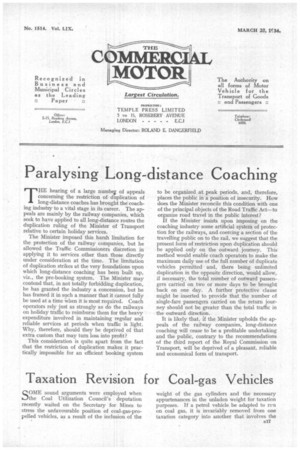Paralysing Long-distance Coaching
Page 35

If you've noticed an error in this article please click here to report it so we can fix it.
THE hearing of a large numbs of appeals concerning the restriction of duplication of long-distance coaches has brought the coaching industry to a vital stage in its career. The appeals are mainly by the railway companies, which seek to have applied to all long-distance routes the duplication ruling of the Minister of Transport relative to certain holiday services.
The Minister imposed this harsh limitation for the protection of the railway companies, but he allowed the Traffic Commissioners discretion in applying it to services other than those directly under consideration at the time. The limitation of duplication strikes at the very foundations upon which long-distance coaching has been built up, viz., the pre-booking system. The Minister may contend that, in not totally forbidding duplication, he has granted the industry a concession, but he has framed it in such a manner that it cannot fully be used at a time when it is most required. Coach operators rely just as strongly as do the railways on holiday traffic to reimburse them for the heavy expenditure involved in maintaining regular and reliable services at periods when traffic is light. Why, therefore, should they be deprived of that extra custom that may turn loss into profit?
This consideration is quite apart from the fact that the restriction of duplication makes it practically impossible for an efficient booking system to be organized at peak periods, and, therefore, places the public in a position of insecurity. How does the Minister reconcile this condition with one of the principal objects of the Road Traffic Act—to organize road travel in the public interest?
If the Minister insists upon imposing on the coaching industry some artificial system of protection for the railways, and coercing a section of the travelling public on to the rail, we suggest that the present form of restriction upon duplication should be applied only on the outward journey. This method would enable coach operators to make the maximum daily use of the full number of duplicate vehicles permitted and, there being unlimited duplication in the opposite direction, would allow, if necessary, the total number of outward passengers carried on two or more days to be brought back on one day. A further protective clause might be inserted to provide that the number of single-fare passengers carried on the return journey should not be greater than the total traffic in the outward direction. .
It is likely that, if the Minister upholds the appeals of the railway companies, long-distance coaching will cease to be a profitable undertaking and the public, contrary to the recommendations of the third report of the Royal Commission on Transport, will be deprived of a pleasant, reliable and economical form of transport.




































































































